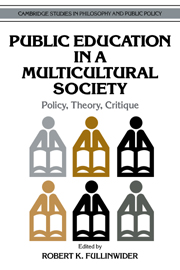Book contents
- Frontmatter
- Contents
- Contributors
- Preface
- PART I INTRODUCTION AND CRITIQUE
- PART II CULTURE AND IDENTITY
- PART III RELATIVISM, REASON, AND PUBLIC EDUCATION
- PART IV TEACHING HISTORY
- 8 Multiculturalism and history: historical perspectives and present prospects
- 9 Patriotic history
- PART V TEACHING LITERATURE
- Index
9 - Patriotic history
Published online by Cambridge University Press: 05 June 2012
- Frontmatter
- Contents
- Contributors
- Preface
- PART I INTRODUCTION AND CRITIQUE
- PART II CULTURE AND IDENTITY
- PART III RELATIVISM, REASON, AND PUBLIC EDUCATION
- PART IV TEACHING HISTORY
- 8 Multiculturalism and history: historical perspectives and present prospects
- 9 Patriotic history
- PART V TEACHING LITERATURE
- Index
Summary
History will never be restored as a subject of value unless it is detached from vulgar utilitarianism; it should not be expected to infuse morals or patriotism.
Diane RavitchEducation for Democracy: A Statement of Principles, issued in 1987 by the American Federation of Teachers, the Educational Excellence Network, and Freedom House, exhorted the nation to “a special effort to raise the level of education for democratic citizenship.” It expressed the “fear that many young Americans are growing up without the education needed to develop a solid commitment to those ‘notions and sentiments’ essential to a democratic form of government.”
What curricular reforms can serve this special effort? “We regard the study of history as the chief subject in education for democracy,” declared Education for Democracy, reflecting a growing movement to re-establish history as a vital part of the school curriculum. In the same year, What Do Our 17-Year-Olds Know?, by Diane Ravitch and Chester Finn, made national headlines with its findings that students are dismally ignorant of historical facts; the Bradley Commission on History in the Schools issued its preliminary report urging increased historical studies; and California, under the guiding hand of Diane Ravitch and Charlotte Crabtree, rewrote its social studies curriculum to require three years of world history and three years of U.S. history between grades five and twelve.
- Type
- Chapter
- Information
- Public Education in a Multicultural SocietyPolicy, Theory, Critique, pp. 203 - 228Publisher: Cambridge University PressPrint publication year: 1996
- 10
- Cited by



